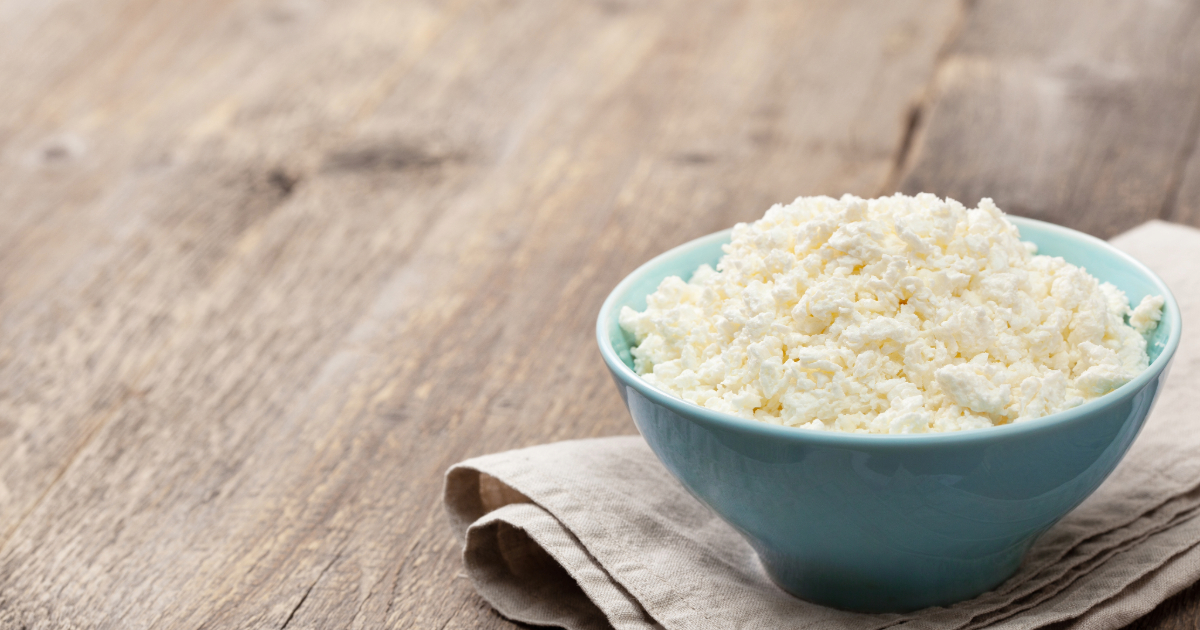Cottage cheese and quark are two types of fresh dairy products that have some similarities but also key differences.

Understanding how they differ in terms of nutrition, texture, taste, and best uses can help you determine which is better suited for your needs.
What is Cottage Cheese?
Cottage cheese is a soft, white cheese made from cow's milk. The curds are separated from the whey and gathered together to form the classic cottage cheese curds that give the cheese its unique texture.
Cottage cheese is known for having a mild, tangy flavor and a lumpy, grainy texture due to the curds. It's typically higher in protein and lower in fat than most other cheeses.
Cottage cheese has been popular for centuries but really grew in popularity in America in the 20th century when it became mass produced. Today it's a dairy staple found in most refrigerators and used in both sweet and savory dishes.
Key Takeaway: Cottage cheese is a fresh cow's milk cheese made by separating curds from whey. It has a tangy flavor, grainy texture from curds, and is high in protein but low in fat.
What is Quark?
Quark is a fresh dairy product originating from Germany made by warming soured milk until it curdles, then straining off the liquid whey.
The resulting quark has a smooth, creamy texture similar to yogurt or sour cream. Its mild, tangy flavor makes it versatile to use in sweet or savory recipes.
While cottage cheese and quark may appear similar, quark has less moisture and more protein compared to cottage cheese. It also lacks the curdy bits found in cottage cheese, resulting in a thicker, creamier texture.
Quark has been popular for centuries in Germany and many Central/Eastern European cuisines, used for everything from breakfast dishes to cheesecakes. It's growing in recognition globally as more people discover its usefulness as an ingredient.
Key Takeaway: Quark is a fresh German dairy product made from soured milk that's creamy and smooth like yogurt with a mild tangy flavor.
Nutrition Comparison
Cottage cheese and quark share some nutritional similarities but also have marked differences, as shown in the table below:
| Nutrient | Cottage Cheese | Quark |
|---|---|---|
| Calories | 98 per 100g | 80 per 100g |
| Protein | 11g per 100g | 14g per 100g |
| Fat | 4g per 100g | 10g per 100g |
| Carbs | 4g per 100g | 4g per 100g |
| Calcium | 83mg (8% DV) | 130mg (13% DV) |
As you can see, quark generally has more protein and less calories compared to cottage cheese. Cottage cheese is lower in fat while quark provides more calcium.
Both offer decent amounts of protein, making them good options if you're looking to add more protein to your diet. But cottage cheese has the advantage for those limiting fats or calories.
Ultimately, if you want higher protein with less fat/calories, choose cottage cheese. But if you don’t mind more fat and want more calcium, quark is a fine choice.
Key Takeaway: Cottage cheese typically has less fat and calories but more protein compared to quark. Quark has more calcium and fat than cottage cheese.
Texture/Consistency Differences
One of the biggest ways cottage cheese and quark differ is in their texture and consistency.
Cottage cheese is known for having a lumpy, grainy texture from milk curds while quark has a much smoother, creamier consistency like thick yogurt.
So if you dislike the clumpy bits in cottage cheese, quark provides a nicer mouthfeel and smoother consistency you'll probably prefer.
But if you enjoy the unique curdy texture of cottage cheese, quark won’t provide that same characteristic texture.
Cottage cheese also tends to be drier than quark since the curds release more whey whereas quark retains more moisture for a thicker, richer consistency.
So for a thicker, creamy texture you'd choose quark but cottage cheese offers more of a dry, crumbly texture in comparison.
Key Takeaway: Quark has a smooth, creamy texture without curds like yogurt while cottage cheese is drier with a lumpy, grainy texture from curds.
Taste Differences
When it comes to flavor, cottage cheese and quark also differ:
Cottage cheese tends to have a tangy dairy flavor sometimes described as milky or buttery. The taste can vary slightly by brand but remains on the mild side.
Quark on the other hand has an even milder flavor, without much dairy tang. It offers a very subtle tanginess similar to yogurt or sour cream.
So between the two, quark lets other ingredients shine more while cottage cheese provides more of that tangy dairy flavor.
Cottage cheese also often contains added salt, giving it a salty taste. Quark rarely has added salt, resulting in a sweeter rather than salty flavor.
When choosing between the two, those who want more of that tangy dairy flavor would prefer cottage cheese. But if you want something milder that won’t overpower other ingredients, quark is the way to go.
Key Takeaway: Cottage cheese has a tangy, salty dairy flavor while quark offers a mild sweet flavor with subtle tang.
Best Uses
When it comes to the best uses for cottage cheese vs quark, there’s some overlap but also key differences.
Cottage cheese works well:
- As a breakfast topping on fruit, toast or oatmeal
- In salads, giving a creamy tang
- Stuffed into things like potatoes, pasta or crepes
- As a veggie dip when blended smooth
- In sweet treats like cheesecake or parfaits
Quark shines when:
- Used like yogurt or sour cream as a base for dips
- Whipped into a sweet dipping sauce for fruit
- Added to smoothies for extra thickness
- Used in German-style cheesecake
- Added to pancake batters
- Served with granola or fruit for breakfast
In general, cottage cheese is better for adding tang and contrasting texture while quark offers neutral creaminess and thickness.
So quark can blend in easier to lots of dishes without changing flavors much, while cottage cheese makes its presence known through taste and texture.
Key Takeaway: Cottage cheese adds tangy flavor and contrasting texture while quark blends in neutrally with subtle creaminess.
Price Differences
When comparing cottage cheese vs quark, price is another factor that differs:
Cottage cheese is widely available and very affordable, with store brand options starting around $2-3 USD per pound. Even premium organic brands usually cost $4-6 per pound.
Quark can be harder to find and costs more, ranging from $5-8+ per pound for store brands. Specialty imported quark runs even higher around $10-15 per pound.
So cottage cheese is clearly the cheaper choice in most countries. Quark's price reflects its artisanal European origins and smaller market availability.
For those wanting to limit spending, cottage cheese provides very good value. But quark may be worth splurging on occasionally for its unique properties.
Key Takeaway: Cottage cheese is widely available for $2-6 per pound while quark costs $5-15+ per pound since it's artisanal.
FAQs
Can I substitute cottage cheese for quark?
Yes, cottage cheese makes a fine substitute for quark in most recipes. The texture will be grainier and flavor tangier though. For best results, blend cottage cheese smooth first.
Is quark better than cottage cheese?
It depends on your needs. Quark has more protein and calcium but cottage cheese is lower in calories and fat. Quark is also smoother and creamier textured. So quark has some advantages nutritionally and texture-wise but cottage cheese suits some diets better.
Is quark healthier than Greek yogurt?
Generally yes, quark has a better nutrition profile with more protein and calcium and less carbs and sugar compared to Greek yogurt brands. But both are excellent options.
Can I make quark at home?
Yes, you can easily make quark by warming milk, adding an acid like vinegar to curdle it, then straining off the whey. Homemade quark may not achieve the smooth store-bought texture but offers a tasty homemade alternative.
Conclusion
Cottage cheese and quark offer similarities like high protein content, mild tangy flavor, and versatility used either sweet or savory.
But quark provides more overall nutrition and a smoother, richer texture compared to the classic grainy curds of cottage cheese.
For a budget-friendly choice that’s widely accessible, stick with cottage cheese.

